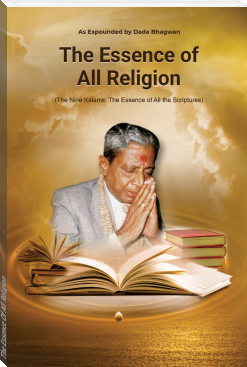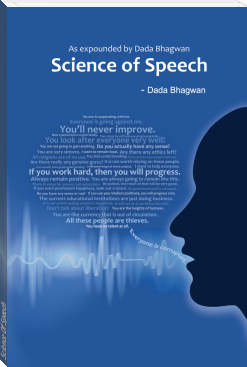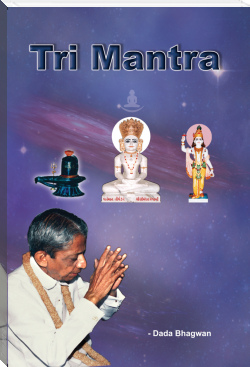author - "Dada Bhagwan"

A lot of people struggle to understand what the truth is, what is right and what is wrong. There is perpetual dilemma to distinguish between right and wrong.
According to Dada Bhagwan, the Gnani Purush (the enlightened one), in the worldly life there are three types of truth. One - absolute truth (self) second - relative truth and third - untruth. In this book, Dadashri has discussed the meaning of absolute and relative truth.
Absolute truth 'I' can never be destroyed, it is eternal. It belongs to the soul (atma). The realization that you are pure soul (shuddha-atma) is eternal, and ultimate truth. Relative truth is what is determined by the people at large. The relative truth may vary from person to person. The relative truth may help us in our development in the relative world, but for real development absolute truth is necessary.
The book presents Pujya Dadashri’s spiritual discourses on absolute and relative truth and the nature of truth.

There are times in life when we must endure suffering due to no fault on our part – or so it seems. In painful circumstances, we naturally question, “Why me? Am I wrong? It’s not my fault!” Such situations may feel like the very definition of suffering.
In the book “Fault is of the Sufferer”, Gnani Purush (embodiment of Self knowledge) Dada Bhagwan provides spiritual solutions to common and everyday forms of suffering such as dealing with difficult people, facing unhealthy relationships, challenges in family relationships, and marriage problems.
Among the myriad of spiritual books available, Dadashri offers a unique resource - addressing the age-old question: “So, am I wrong, or am I faultless?” He provides profound insight into the law of karma – explaining who is “The Doer”, who is at fault, and what is the cause in every instance of suffering.
Whether seeking relationship tips, marriage advice, or simply to learn how to stay healthy, this book will prove an invaluable resource.

Those seeking to lead a spiritual life inevitably face challenges in their sincere pursuit of spirituality and practice. As spiritual development progresses, facing the many unintentional mistakes made through mind, speech, and conduct become disconcerting.
Naturally one begins to wonder, “How to forgive and forget in unhealthy relationships?”, “How to forgive yourself - both for mistakes of the past and for ongoing mistakes in the present?”
One of the most powerful tools for spiritual healing of both past and present is repentance with sincere apology. Yet, it is rare to find a concise scripture on forgiveness.
In the book “Pratikraman: Freedom Through Apology & Repentance”, Gnani Purush (embodiment of Self knowledge) Dada Bhagwan describes the spiritual power of forgiveness prayer, and offers a precise formula for asking for forgiveness. The book allows anyone seeking to practice spiritual forgiveness prayer to easily understand how to repent, how to forgive someone, and self.

Those seeking to lead a spiritual life inevitably face challenges in their pursuit of spirituality and practice. As spiritual development progresses, facing one’s faults, failures, and unintentional mistakes become disconcerting – even for the most sincere seeker.
One may then ask, “What are the benefits of the different types of religion? From the many religions of the world, which practices will accelerate my spiritual growth? In actuality, how to live exactly?”
In the book “The Essence of All Religion”, Gnani Purush ((the enlightened one) Dada Bhagwan clarifies any confusion about religion vs. spirituality.
Dadashri offers the essential extract of spiritual science and religion in the form of Nine Kalams (highest spiritual intents). He explains that the Nine Kalams are the essence of the highest teaching of the religions of the world and the simplest, most direct means to live in peace.
The spiritual guidance available in this book is both unique and unparalleled.

Those seeking to lead a spiritual life may naturally become inspired to live in peace and non violence. To learn spiritual practices to develop these values, one may turn to spiritual teachers, and to variety of religion.
But beginning to cultivate spiritual awareness is not always as simple as it seems – especially in family / unhealthy relationships, or while dealing with difficult people. Daily interactions such as these may feel like the very definition of conflict!
In the book “Spirituality in Speech”, Gnani Purush (embodiment of Self knowledge) Dada Bhagwan offers key understanding about non violent communication, along with conflict resolution skills and conflict management strategies. His spiritual teaching on how to resolve conflict - or to avoid it altogether - is offered in the context of common and everyday relationship challenges.
Whether wondering how to become more spiritual, or simply how to deal with negative people and difficult people, this book will prove invaluable.

Those seeking to lead a spiritual life, or just wondering how to become more spiritual may become inspired towards serving others, or giving Seva (selfless service).
One might be left wondering, “Is service to humanity a higher means to make a donation – or should I simply donate to charity? What are the best charities to donate to, or to serve? How does Seva support my spiritual development? Is there spiritual power and spiritual transformation to be gained through it?”
In the book “Right Understanding To Help Others: Benevolence”, Gnani Purush (embodiment of Self knowledge) Dada Bhagwan offers precise understanding about people helping others and the many benefits Seva has upon one’s spiritual growth.
Dadashri explains that happiness begins from the moment one begins serving others and in offering Seva, one’s life will never lack for material comfort and happiness.

For those wondering how to lead a spiritual life, Pure Love emerges as an essential value. Naturally one begins inquiring into the ultimate meaning of love, true love, and unconditional love.
Other questions may also arise, such as:
To cultivate unconditional love, is forgiveness required? If so, how can I learn to practice forgiveness prayer?
In the context of unconditional love, what is marriage? Can a husband and wife relationship transform into living for love, and ultimately become an example of love supreme?
In the book “Pure Love”, Gnani Purush (embodiment of Self knowledge) Dada Bhagwan offers a profound definition, and explanation of unconditional love, and describes how Pure Love grows naturally with spiritual development.
Dadashri explains that the knowledge of Self, and blossoming of Pure Love is one of the signs of spiritual awakening.
This resource on the topic of Pure Love will prove invaluable to begin the spiritual path.

Those seeking to lead a spiritual life may become curious as to what is ahimsa (non violence), and inspired to practice it.
But understanding how to live in non violence is not as simple as it seems, and practicing no violence in daily life can quickly become bewildering. To someone just beginning to cultivate non-violence, daily interactions might even begin to feel like the very definition of conflict!
In the book “Non-Violence”, Gnani Purush (embodiment of Self knowledge) Dada Bhagwan offers key understanding on how to define ahimsa (non violence) and how to avoid kashaya (internal self harm).
Dadashri explains that kashaya is at the root of self harming, unhealthy relationships, and violence. Here, he teaches how to live in peace, offering profound knowledge of non violent communication, conflict resolution skills, and conflict management strategies.

The religions of the world preserve the knowledge and protect the secrets of ancient powerful mantras.
At the heart of world religion, and among the most powerful mantras in the history of religion, is the Navkar mantra, or Trimantra.
In the book “Trimantra”, Gnani Purush (embodiment of Self knowledge) Dada Bhagwan explains the Trimantra, its mantra meaning, and the extraordinary benefits of its recitation.
Whether wishing to live with no worry while facing problems in everyday life, wondering how to get inner peace, or on a spiritual quest seeking spiritual enlightenment (self realization), utilizing Trimantra provides that – and more.
Among the many spiritual books available today, Dadashri’s spiritual guidance about the value of Trimantra, and how to best access its spiritual power, is invaluable.

Among the myriad of relationships in life, the one between a Guru and disciple is most sacred and unique.
In the book “Guru and Disciple”, Gnani Purush (embodiment of Self knowledge) Dada Bhagwan provides insight into the nature of the Guru-disciple relationship and offers in-depth answers to questions like:
“What are definitions of Guru, and disciple? How is a Guru necessary in spiritual transformation?”
“How does a spiritual Guru differ from a spiritual teacher, a spiritual advisor, or from spiritual people in general?”
“How do I find a Guru with the spiritual power to grant me spiritual enlightenment required in a spiritual life?”
“Among the many spiritual teachers accessible today, do I need to find a Guru with a certain level of spiritual development or spiritual awareness?”
For those on a spiritual quest, seeking spiritual growth, or simply desirous of spiritual guidance, this book provides an invaluable resource among the spiritual books available on the Guru-disciple.

A lot of people struggle to understand what the truth is, what is right and what is wrong. There is perpetual dilemma to distinguish between right and wrong.
According to Dada Bhagwan, the Gnani Purush (the enlightened one), in the worldly life there are three types of truth. One - absolute truth (self) second - relative truth and third - untruth. In this book, Dadashri has discussed the meaning of absolute and relative truth.
Absolute truth 'I' can never be destroyed, it is eternal. It belongs to the soul (atma). The realization that you are pure soul (shuddha-atma) is eternal, and ultimate truth. Relative truth is what is determined by the people at large. The relative truth may vary from person to person. The relative truth may help us in our development in the relative world, but for real development absolute truth is necessary.
The book presents Pujya Dadashri’s spiritual discourses on absolute and relative truth and the nature of truth.

There are times in life when we must endure suffering due to no fault on our part – or so it seems. In painful circumstances, we naturally question, “Why me? Am I wrong? It’s not my fault!” Such situations may feel like the very definition of suffering.
In the book “Fault is of the Sufferer”, Gnani Purush (embodiment of Self knowledge) Dada Bhagwan provides spiritual solutions to common and everyday forms of suffering such as dealing with difficult people, facing unhealthy relationships, challenges in family relationships, and marriage problems.
Among the myriad of spiritual books available, Dadashri offers a unique resource - addressing the age-old question: “So, am I wrong, or am I faultless?” He provides profound insight into the law of karma – explaining who is “The Doer”, who is at fault, and what is the cause in every instance of suffering.
Whether seeking relationship tips, marriage advice, or simply to learn how to stay healthy, this book will prove an invaluable resource.

Those seeking to lead a spiritual life inevitably face challenges in their sincere pursuit of spirituality and practice. As spiritual development progresses, facing the many unintentional mistakes made through mind, speech, and conduct become disconcerting.
Naturally one begins to wonder, “How to forgive and forget in unhealthy relationships?”, “How to forgive yourself - both for mistakes of the past and for ongoing mistakes in the present?”
One of the most powerful tools for spiritual healing of both past and present is repentance with sincere apology. Yet, it is rare to find a concise scripture on forgiveness.
In the book “Pratikraman: Freedom Through Apology & Repentance”, Gnani Purush (embodiment of Self knowledge) Dada Bhagwan describes the spiritual power of forgiveness prayer, and offers a precise formula for asking for forgiveness. The book allows anyone seeking to practice spiritual forgiveness prayer to easily understand how to repent, how to forgive someone, and self.

Those seeking to lead a spiritual life inevitably face challenges in their pursuit of spirituality and practice. As spiritual development progresses, facing one’s faults, failures, and unintentional mistakes become disconcerting – even for the most sincere seeker.
One may then ask, “What are the benefits of the different types of religion? From the many religions of the world, which practices will accelerate my spiritual growth? In actuality, how to live exactly?”
In the book “The Essence of All Religion”, Gnani Purush ((the enlightened one) Dada Bhagwan clarifies any confusion about religion vs. spirituality.
Dadashri offers the essential extract of spiritual science and religion in the form of Nine Kalams (highest spiritual intents). He explains that the Nine Kalams are the essence of the highest teaching of the religions of the world and the simplest, most direct means to live in peace.
The spiritual guidance available in this book is both unique and unparalleled.

Those seeking to lead a spiritual life may naturally become inspired to live in peace and non violence. To learn spiritual practices to develop these values, one may turn to spiritual teachers, and to variety of religion.
But beginning to cultivate spiritual awareness is not always as simple as it seems – especially in family / unhealthy relationships, or while dealing with difficult people. Daily interactions such as these may feel like the very definition of conflict!
In the book “Spirituality in Speech”, Gnani Purush (embodiment of Self knowledge) Dada Bhagwan offers key understanding about non violent communication, along with conflict resolution skills and conflict management strategies. His spiritual teaching on how to resolve conflict - or to avoid it altogether - is offered in the context of common and everyday relationship challenges.
Whether wondering how to become more spiritual, or simply how to deal with negative people and difficult people, this book will prove invaluable.

Those seeking to lead a spiritual life, or just wondering how to become more spiritual may become inspired towards serving others, or giving Seva (selfless service).
One might be left wondering, “Is service to humanity a higher means to make a donation – or should I simply donate to charity? What are the best charities to donate to, or to serve? How does Seva support my spiritual development? Is there spiritual power and spiritual transformation to be gained through it?”
In the book “Right Understanding To Help Others: Benevolence”, Gnani Purush (embodiment of Self knowledge) Dada Bhagwan offers precise understanding about people helping others and the many benefits Seva has upon one’s spiritual growth.
Dadashri explains that happiness begins from the moment one begins serving others and in offering Seva, one’s life will never lack for material comfort and happiness.

For those wondering how to lead a spiritual life, Pure Love emerges as an essential value. Naturally one begins inquiring into the ultimate meaning of love, true love, and unconditional love.
Other questions may also arise, such as:
To cultivate unconditional love, is forgiveness required? If so, how can I learn to practice forgiveness prayer?
In the context of unconditional love, what is marriage? Can a husband and wife relationship transform into living for love, and ultimately become an example of love supreme?
In the book “Pure Love”, Gnani Purush (embodiment of Self knowledge) Dada Bhagwan offers a profound definition, and explanation of unconditional love, and describes how Pure Love grows naturally with spiritual development.
Dadashri explains that the knowledge of Self, and blossoming of Pure Love is one of the signs of spiritual awakening.
This resource on the topic of Pure Love will prove invaluable to begin the spiritual path.

Those seeking to lead a spiritual life may become curious as to what is ahimsa (non violence), and inspired to practice it.
But understanding how to live in non violence is not as simple as it seems, and practicing no violence in daily life can quickly become bewildering. To someone just beginning to cultivate non-violence, daily interactions might even begin to feel like the very definition of conflict!
In the book “Non-Violence”, Gnani Purush (embodiment of Self knowledge) Dada Bhagwan offers key understanding on how to define ahimsa (non violence) and how to avoid kashaya (internal self harm).
Dadashri explains that kashaya is at the root of self harming, unhealthy relationships, and violence. Here, he teaches how to live in peace, offering profound knowledge of non violent communication, conflict resolution skills, and conflict management strategies.

The religions of the world preserve the knowledge and protect the secrets of ancient powerful mantras.
At the heart of world religion, and among the most powerful mantras in the history of religion, is the Navkar mantra, or Trimantra.
In the book “Trimantra”, Gnani Purush (embodiment of Self knowledge) Dada Bhagwan explains the Trimantra, its mantra meaning, and the extraordinary benefits of its recitation.
Whether wishing to live with no worry while facing problems in everyday life, wondering how to get inner peace, or on a spiritual quest seeking spiritual enlightenment (self realization), utilizing Trimantra provides that – and more.
Among the many spiritual books available today, Dadashri’s spiritual guidance about the value of Trimantra, and how to best access its spiritual power, is invaluable.

Among the myriad of relationships in life, the one between a Guru and disciple is most sacred and unique.
In the book “Guru and Disciple”, Gnani Purush (embodiment of Self knowledge) Dada Bhagwan provides insight into the nature of the Guru-disciple relationship and offers in-depth answers to questions like:
“What are definitions of Guru, and disciple? How is a Guru necessary in spiritual transformation?”
“How does a spiritual Guru differ from a spiritual teacher, a spiritual advisor, or from spiritual people in general?”
“How do I find a Guru with the spiritual power to grant me spiritual enlightenment required in a spiritual life?”
“Among the many spiritual teachers accessible today, do I need to find a Guru with a certain level of spiritual development or spiritual awareness?”
For those on a spiritual quest, seeking spiritual growth, or simply desirous of spiritual guidance, this book provides an invaluable resource among the spiritual books available on the Guru-disciple.